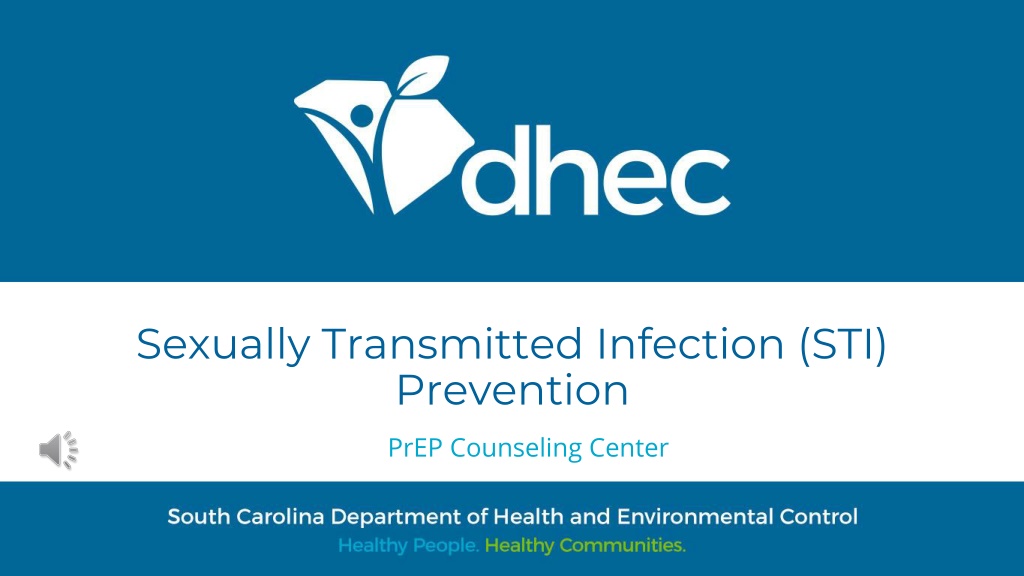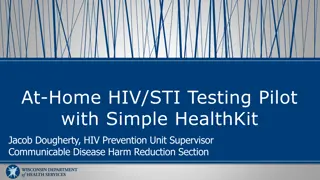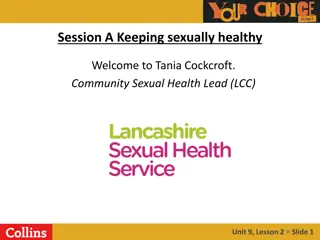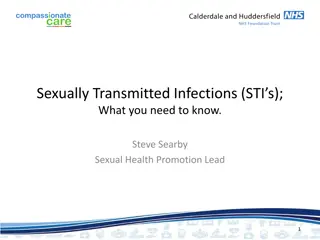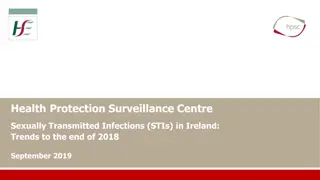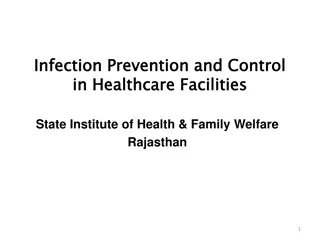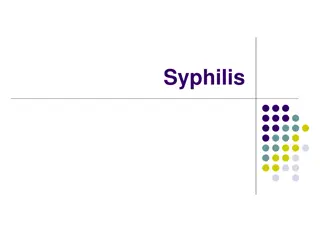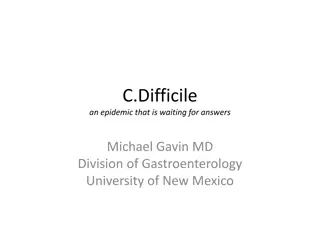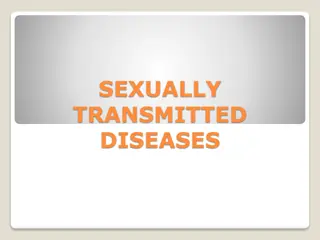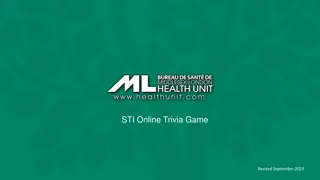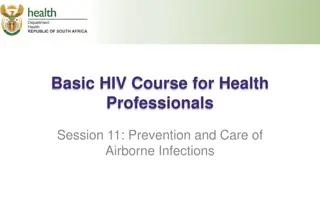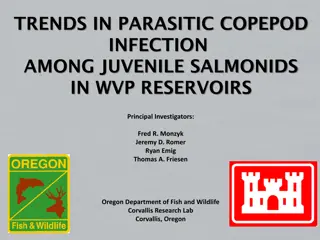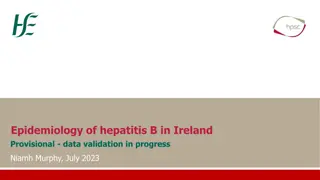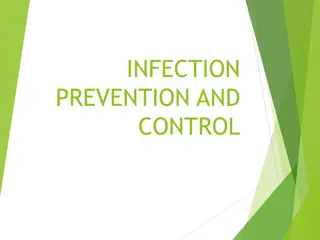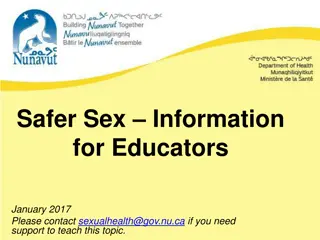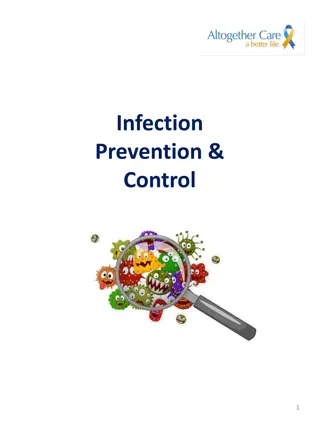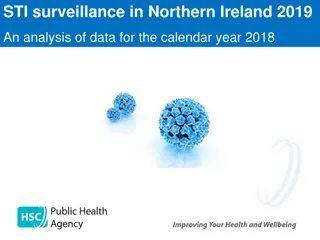Sexually Transmitted Infection (STI) Prevention
Sexually Transmitted Infections (STIs) are infections passed through sexual contact, impacting both men and women. Common STIs include Chlamydia, Gonorrhea, Syphilis, HPV, HIV, Genital Herpes, and Trichomoniasis. Testing is crucial for sexually active individuals, pregnant women, and high-risk groups. Early detection, treatment, and prevention are key in combating STIs. Recognizing symptoms such as unusual discharge, sores, pain, itching, and fever is important for prompt intervention.
Download Presentation

Please find below an Image/Link to download the presentation.
The content on the website is provided AS IS for your information and personal use only. It may not be sold, licensed, or shared on other websites without obtaining consent from the author.If you encounter any issues during the download, it is possible that the publisher has removed the file from their server.
You are allowed to download the files provided on this website for personal or commercial use, subject to the condition that they are used lawfully. All files are the property of their respective owners.
The content on the website is provided AS IS for your information and personal use only. It may not be sold, licensed, or shared on other websites without obtaining consent from the author.
E N D
Presentation Transcript
Sexually Transmitted Infection (STI) Prevention PrEP Counseling Center
What is a STI? Sexually transmitted diseases (STDs), or sexually transmitted infections (STIs), are infections that are passed from one person to another through unprotected sexual contact. STIs are usually spread during vaginal, oral or anal sex. Some STIs can be passed during pregnancy or birth to the baby (vertical transmission). They can also be spread through breastfeeding, blood transfusions, or by sharing injection drug equipment (needles).
Common STIs Most common STIs include: Chlamydia Gonorrhea Syphilis Human Papillomavirus (HPV) or genital warts HIV Genital Herpes Trichomoniasis
Facts about STIs STIs can be caused by bacteria, viruses and parasites. Most STIs affect both men and women, but in many cases the health problems they cause can be more severe for women. A majority of STIs don t cause symptoms or may only cause mild symptoms. STIs can be extremely harmful if not treated. Some STIs cannot be cured, only treated. The most common and curable STIs are trichomonas, chlamydia, and gonorrhea. Rapidly increasing antimicrobial resistance is a growing threat for untreatable gonorrhea.
Who Should be Tested? Anyone who is sexually active, and their partners. All adolescents and adults from 13 to 64 should be tested for HIV at least once. All sexually active women younger than 25 should be tested for gonorrhea and chlamydia every year. Women older than 25 with certain risk factors or multiple partners should be tested at least once a year.
Who Should be Tested? Everyone who is pregnant should be tested for syphilis, HIV, hepatitis B and hepatitis C early within the pregnancy. Repeat syphilis testing during pregnancy indicated based on geography. Gay and bisexual men and other men who have sex with men (MSMs) should be tested once a year for syphilis, chlamydia, and gonorrhea. Those with multiple partners should be tested more frequently (every three to six months) Anyone who shares needles and injection drug equipment.
Evaluation of Symptoms It is crucial to remember that all STIs may not cause symptoms, but even without symptoms the disease or infection can still be spread. Common symptoms include: Unusual discharge from the penis or vagina Sores, ulcers or warts on the genital area Painful or frequent urination Itching and redness in the genital area Abnormal vaginal odor Anal itching, soreness or bleeding Abdominal pain Fever
STI Prevention Abstinence is the most reliable way to avoid infection, but not always practical Vaccination: vaccines are available to prevent hepatitis B and HPV Reduce number of sex partners Practice mutual monogamy Condoms: correct and consistent use of latex condoms is highly effective in reducing STI transmission HIV PrEP or nPEP prevents HIV only DoxyPEP antibiotic that can prevent chlamydia, syphilis, gonorrhea
Tips for talking about STIs - Sexual health is sexy! Ask any new partner if they get tested for STIs regularly. Be open to sharing your STI testing history. Ask your partner if they've had any new sexual partners recently or if they're having STI symptoms. Ask partners about HIV PrEP and DoxyPEP. Ask partners if they want to use condoms or some other prevention method.
CONDOMS A condom should be used every time you have anal, vaginal or oral sex. Synthetic non-latex condoms are available for those who have latex allergies. Natural membrane condoms are not recommended for STD prevention. Condoms should be worn appropriately, especially when selecting the correct condom size.
What is DoxyPEP? DoxyPEP is a post-exposure preventative treatment for bacterial STIs such as syphilis and chlamydia. DoxyPEP should be taken within 24 hours (up to 72 hours) after condomless sexual encounter to greatly reduce your chance of contracting a bacterial STI. Think of it like a morning after pill for STIs. DoxyPEP does NOT help prevent HIV, mpox or other viral infections.
Who should take DoxyPEP? Anyone assigned male at birth and at least 12 years of age. Anyone who has been diagnosed with at least one bacterial STI (chlamydia, gonorrhea, syphilis) in the last 12 months. People who have had condomless sexual contact with at least one person assigned male at birth in the last 12 months. MSMs with multiple sexual partners but without a recent STI would still benefit from DoxyPEP.
5 things to know about STIs 1. STIs are very common and are nothing to be embarrassed about. 2. STIs often show no symptoms. Many people with an STI don t know it. 3. Left untreated, STIs can cause serious health problems. 4. Good news! All STIs are treatable (including HIV), and many are curable. 5. Get tested, know your STI and HIV status.
Protect Yourself Get Tested Routinely
References American College of Obstetricians and Gynecologists [ACOG], 2024, STIs, https://www.acog.org/womens-health/faqs/how-to-prevent-stis. Centers for Disease Control and Prevention [CDC], 2024, STD Information, https://www.cdc.gov/std/prevention/default.htm. WE>HIV, 2024, Let s Talk About STDs, https://www.greaterthan.org/sexually-transmitted- diseases/?utm_source=bing&utm_medium=cpc&utm_campaign=GTA%20- %20STDs&utm_term=std%20information&utm_content=GTA%20- %20STD%20landing%20page.
Andre Jennings, DHA, HIV-PCP PrEP Program Coordinator II DHEC Central Office Office: 803-898-8088 Cell: 803-973-1349 Email: jenninaj@dhec.sc.gov
